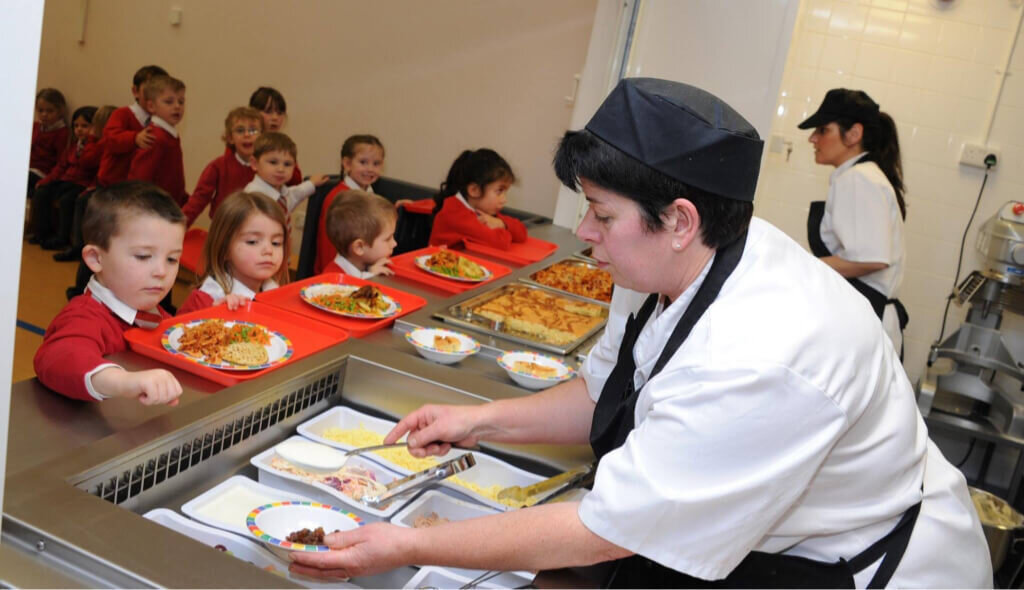
Incoming Welsh Government Must Fix Shameful Free School Meals Exclusion, Anti-poverty Groups Say
HALF OF WALES’ POOREST CHILDREN ARE CURRENTLY EXCLUDED FROM FREE SCHOOL MEALS
A NEW REPORT SAYS THAT IT WOULD COST JUST 0.6% OF WELSH GOVERNMENT’S BUDGET TO FIX, AND SAVE STRUGGLING PARENTS AND CARERS THOUSANDS EVERY YEAR
BUT CAMPAIGNERS SAY ALL CHILDREN SHOULD RECEIVE A FREE MEAL AT SCHOOL, NOT JUST THOSE IN POVERTY.
A coalition of anti-poverty groups have written to the incoming Welsh Government to demand that the expansion of free school meals has to be a priority. Members of the Wales Anti-Poverty Coalition have been working on the issue for a number of years, but say that the pandemic has highlighted the issue of Free School Meals like never before.
The coalition of groups, which include Oxfam, the Bevan Foundation, the Child Poverty Action Group and The Trussell Trust, who organise Foodbanks across Wales, say the evidence for taking action is now overwhelming.
“Too many children who are trapped in poverty are denied access to FSM [Free School Meals] due to arbitrary eligibility criteria,” the letter says. The demand comes as two major new reports back up the case for change.
The group’s claim it would cost just 0.6% of Welsh Government’s budget to ensure all children in poverty (those whose household’s receive universal credit) are made eligible for the provision. They say that the change must be enacted by September next year.
The letter is addressed to the incoming Welsh Labour Government, which won another term in office after a strong result in Senedd elections last Thursday. The party is expected to govern without any formal agreement with opposition parties.
Whilst the party committed to reviewing the situation in their manifesto, they twice voted down a motion that would have compelled them to make the change.
Highest child poverty rate
Last year, research by the Child Poverty Action Group published explosive research that blew the lid on Wales’s shocking record when it came to child hunger and child poverty.
The organisation revealed that around 70,000 children who live in poverty in Wales, over half the total number, do not meet the threshold to receive free school meals, even though their only household income is from universal credit.
Wales currently has the highest rate of child poverty anywhere in the UK, and the report highlighted that Wales is also the worst of the four nations when it comes to guaranteeing a hot meal to its poorest children.
Last month, the Trussell Trust reported that the crisis was so severe that over 54,000 food parcels had to be given to children in Wales between April 2020 and March 2021. This amounted to one parcel every ten minutes- a stark indicator of how many children in Wales face food poverty.
In the course of the past six months, Welsh Government twice voted down a motion which would have extended the number of children who received a free school meal in Wales. Ellie Harwood, of the Child Poverty Action Group, told a voice.wales podcast that this was in spite of the fact that they received enough funding to make the uplift. Campaigners have been demanding that the system is changed as a matter of priority in Wales, first to include all children in poverty, but eventually to include all pupils.
Financial pressure
“The arguments in favour of reform are long established,” the letter to the incoming Welsh Government says.
“Too many children who are trapped in poverty are denied access to FSM [Free School Meals] due to arbitrary eligibility criteria. This means that children miss out on the health and educational benefits of a healthy meal, whilst already struggling families are placed under significant financial pressure.”
The letter comes on the back of two major reports on the issue, which their authors claim make an overwhelming case for urgent change.
The Bevan Foundation, one of the signatories to the letter, conducted the reports with the Wales Anti-Poverty Coalition to assess the impact of expanding free school meals. Their findings reveal how much money some of Wales’s poorest families would save if they no longer had to pay for their child’s school lunches every day.
The first report found that extending free school meals to all children whose families are eligible for Universal Credit would only cost Welsh Government £10.5m a year.
“To put that £10.5m in context,” says Steffan Evans, of the Bevan Foundation. “That is less than 0.06% of the Welsh Government’s total revenue budget”
However, the potential savings to low-income families could be significant. According to the report, if the change was made, then those households who would become eligible for free school meals would save an average of £1,280.59 per year, or £764.30 per child per year. “This would total £20.9M per year if all children living in households eligible for Universal Credit were eligible for FSM and take up their entitlement,” the report says.
Barriers to change “easily surmountable”
The second report assesses how the change could be made, and concludes that there are “no major barriers” to ensuring all children from households receiving universal credit get a guaranteed meal every day. “The cost of expanded provision is small in the context of the Welsh Government’s budget whilst many of the practical barriers are easily surmountable,” the authors conclude.
The open letter, signed by 11 groups and addressed to the incoming Labour Government after the party’s successful election result last week, says that the system must be changed by September 2022 at the latest.
Welsh Labour pledged in their manifesto to review the eligibility criteria for free school meals.
But many of the groups who signed the letter, and others who have been campaigning on the issue, want the reforms to go much further. They say that the expansion of free school meals to all children in poverty must be the first step in making the provision free to all children in Wales, regardless of income.
A Senedd petition, launched by People’s Assembly Wales and backed by anti-poverty groups, argues that the benefits of universal free school meals for all school-aged children in Wales will include helping family budgets and home life, creating bonds in the dinner hall through shared meal experiences, improving health inequalities among children, reducing obesity and increasing free school meals uptake by reducing stigma associated with means tested benefits.
The Bevan Foundation report says that implementation of free school meals for all children in Wales would require larger school catering facilities and investment, but says that the “ongoing revenue costs associated with such a change, however, are manageable and the potential benefits significant.”
The organisation estimates that the cost of extending FSM eligibility to all households, irrespective of household income or benefit eligibility, would be an extra £140.7M per year.
To put this figure into context, the UK government – which control most of the money Welsh Government receives – confirmed in March this year an extra £24bn of military spending over the next four years. This is on top of an average annual military spend of around £40 – £50billion.



1 Comment
Comments are closed.